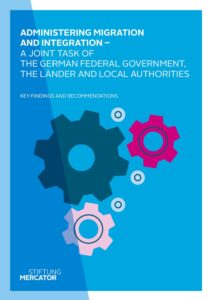The reception and integration of refugees on the one hand and how to deal with the continuing global waves of migration on the other hand are topics dominating public debate in Germany. The challenges facing Germany’s administration at all levels continue to exist, though the focus is now more on integration and less on migration and seeking asylum. For many years now, a focus of Stiftung Mercator work has been on ways to successfully integrate migrants in Germany. It strongly supports the authors of this study in their desire to put a greater spotlight on integration and the current challenges facing it, while at the same time making recommendations on how to overcome these.
Funded by Stiftung Mercator, the aim of this study entitled ‘Administering immigration and integration – a joint task of the German federal government, the Länder and local authorities’ is to contribute positively to the debate on asylum and integration policy in Germany, providing information, arguments and recommendations. To arrive at practical solutions in Germany, we need expert knowledge, especially with regard to administrative and constitutional law.
The authors of this study, political scientists Jörg Bogumil and Sabine Kuhlmann and constitutional expert Martin Burgi, together with their respective teams, have analysed Germany’s administrative and organisational structures at the various government levels. The findings presented here clearly show where coordination between the various levels is succeeding and where there are deficits still needing to be overcome. The authors end the study with a series of practical recommendations on how coordination between the federal government, the Länder and local authorities can be improved – with or without changes to existing legislation – and further developed.


